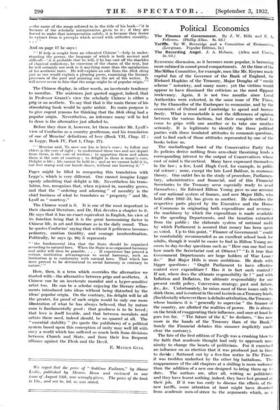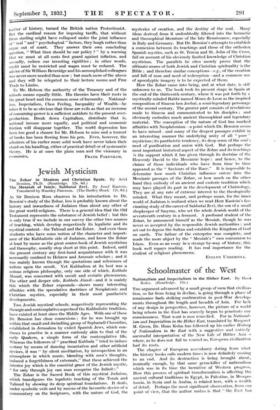Political Economics
The Finance of Government. By J. W. Hills and E. A; Fellowes. (Phillip Allan. Ss. 6d.) Tariffs. Sir W. Beverid,ge and a Cornniittee of -Economists; .(Longman. Popular Edition, Is.)
The Recording Angel. 3. A. Hobson. (Allen and trawl% . 38. Od.) ECONOMIC discussion, as it becomes more popular, is becoming More cabined in sound=proof compartments. At the time.of the MacMillan Committee, for example, men like Mr. Keynes made capital fun of the Governor of the Bank of England, Sir
Richard Hopkins of the Treasury, Major Douglas of " credit scheme " notoriety, and many more; yet the victims would appear to have dismissed the criticism as the most flippant irrelevancy. Again, it • is -not two months since Local Authorities were exhorted, in the same issue of The Times, by the Chancellor of the Exchequer to economize, and by the economists of Oxford and Cambridge to spend and borrow freely. What is remarkable is not the differences of opinion between the various factions, but their complete refusal to come to grips with one another or to take one another
seriously. It is legitimate to identify the three political parties with three insulated attitudes to economic questions, and to find each of those attitudes represented by one of the books before us.
The unchallenged boast of the Conservative Party that its policies derive nothing from arm-chair theorizing lends a corresponding interest to the output of Conservatives whose cast of mind is theoretical. Many have expressed themselves in the law ; a few, Lord Hugh Cecil, for example, in politi- cal science ; none, except the late Lord Balfour, in economic
theory. One outlet lies in the study of procedure, Parliamen- tary, administrative and financial, and of this Financial Secretaries to the Treasury seem especially ready to avail themselves ; Sir Edward Hilton Young gave us one account of our national system of finance, and now Major Hills, who held office 1922-23, has given us another. He describes the respective parts played by the Executive and the House Of Commons in originating both expenditure and revenue ; the machinery by which the expenditure is made available
to the spending Departments, Sand the taxation extracted from the public ; the elaborate system of national audit by which Parliament is assured that money has been spent
as voted. Up to this point, " Finance of Government ",could he comfortably recommended as an excellent school book for adults, though it would be easier to find in Hilton Young an- swers to day-to-day questions such as " How can one find out how much the Secretariat cost at Ottawa ?" "Is it true that Government Departments are large holders of War Loan ?
&c." But Major Hills is more ambitious. He deals with bigger questions : " Ought Parliament to hase. effective
control over expenditure ? Has it in fact such .control If not,. where does the ultimate responsibility lie ? " and with Inflation and Deflation, the ultimate responsibility for our present credit policy, Conversion strategy, past and future, .&c., &c. Unfortunately, he raises most of these issues only to shirk them, and is content in the end to circle on a Treasury leash. (Incidentally wherever there is definite attribution; the Treasury, whose business it is " generally to supervise " the finance of the country, are allotted the realities of power. He is always
on the brink of exaggerating their influence, and once at least he goes too far. " The future of the £," he declares, " lies now
more in the hands of the Treasury than of the Bank." Surely the Financial debates this summer implicitly made clear the contrary).
The fate of the first edition of Tariffs was a crushing blow to the faith that academic thought had only to approach una- nimity to change the hearts_ of politicians. For it exercised no influence on an election that it was produced just in time to decide ; flattened out by a five-line notice in The Times, it was trodden underfoot by the other big battalions. The reappearance of the-old chapters at a shilling is more welcome
than the addition of a new one designed to bring -them up to
date.- The authors are, after all, writing as politicians and they have learnt nothing, indeed, they have lost ground at
their job. If it was too early to discuss the effects of Ala' new tariffs, some attention at least might have diverted from academic men-of-straw to the arguments which, as a matter of history, turned the British nation Protectionist. But the cardinal reason for imposing tariffs, that without them sterling might have collapsed under the joint influence of real " and " psychological " factors, they laugh rather than argue out of court. They answer their own concluding question, " What then should be our policy ? " by a warning that we must at all costs first guard against inflation, and secondly, reduce our investing rigidities ; in other words, credit must be restricted and wages must be reduced. The advice of Sir William Beveridge and his accomplished colleagues was never more needed than now ; but much more of the above and they will be relegated to their lecture rooms and Free Trade to Limbo.
To Mr. Hobson the authority of the Treasury and of the schools means equally little. His theories have their roots in the great heart and the common sense of humanity. National- ism, Imperialism, Class Feeling, Inequality of Wealth—he takes it to be as obvious that these are evils as that an increase of consuming-power is a sufficient antidote to the present over- production. Break down Capitalism, distribute that is, national income more equally, and political and economic friction will disappear together. The world depression has been too good a chance for Mr. Hobson to miss and a torrent of books has been flowing from his pen. Even, however, the admirers of his earlier more solid work have never taken their stand on his handling, either of practical detail or of systematic theory. He is at once the plain man and the visionary in































 Previous page
Previous page